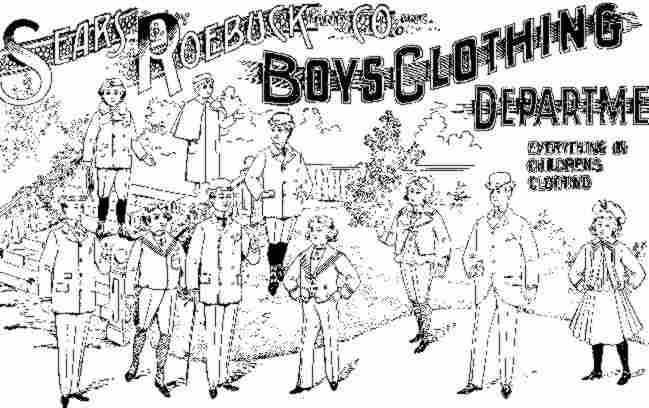
Figure 1.--This is the front page of the boys clothing section from the 1897 catalog. It show cases many of the fashions worn by American boys in that year.


Figure 1.--This is the front page of the boys clothing section from the 1897 catalog. It show cases many of the fashions worn by American boys in that year. |
Catalogs in 1897 offered kilt suits for younger boys. The kilt suits were made for boys through age 4. After breeching boys might wear Fautleroy suits or sailor suits. Older boys wore knee pants and long pants suits. Boys wore fancy Fauntleroy blouses with both velvet Fauntleroy suits as well as regular suits. Long stockings were an important item and stocking supporters were sold to hold them up.
The Sears 1897 catalog offered kiltsuits for boys from 2 1/2
through 4 meanig that boys might commonly wear them
through about age 5. Sears aimed its suits at the wider
Anmerican consumer. It thus was probably a fairly good
indicator as to the age these suits were being wiorn in 1897 at
the turn of tghe century. I'm not sure if this age range would
have also applied to more affluent families. The Sears catalog
provided valuable information on materials and detailing. Sears offered these general instructions and stressed that
these were outfits for boys. The section was headlined,
"Children's Klit Suits Children Ages, 2 1/2, 3, 3 1/2, and 4
Years". Sears advised mothers "In ordering these suits be
sure to state age of boy and say whether large or small of his
age. Our line of Kilt Suits is very complete and embraces
about 50 styles; but for your consuderation we present to you
two special bargains selected from all the suits that we are
offering at a price that is sure to bring orders for those in need
of this class of goods.
The 1897 Sears catalog provies information on boys blouses or shirt waists for boys from 4 to 14. Some styles were available from 4
to 14, but fancier styles only from 4-8 or 4-12. A few of the fancier blouses were made in size three also, presumably because
they could be worn with skirt or kilt outfits before the boy was breeched. Sears offers both plain and fancy Fauntleroy styles in
white and a variety of colors. The black an white photographs of the day suggest that most blouses were white. It is interesting to
note here that a wide variety of colored blouses were available--including pink ones. Note that in the Sears text, the term "waist and "blouse" are used interchangeably. One
interesting obsetrvation, many of the fancier blouse styles are cheaper than tyhe plainer styles. One would expect the famcier styles
which take more work to produce would have been the most expensive.
Our $4.95 two-piece reefer suit, sometimes called the military
reefer, is the most sightly reefer suit made regardless of price.
It comes in sizes three to eight. In ordering be sure to state age
of boy and say wheter large or small for his age. If to be sent
by mail enclose 28 cents extra to pay postage. This suit is
made from ablack and blue mixed imported wool cashmere;
the background is black with blue mixture on very small dots
which gives it a very neat and stylish appearance. It is of the
latest patterns from a very relaible woolen meal and wear
resistant cloth.
Sears in 1897 offered quite a range of boys'
kneepants suits. Intetrestingly, the fashion of boys
wearing kneepants was so widespread, that the
advertising copy did not even mention the length of the
pants. Younger boys wearing these suits probably
would have worn dresses, kilt suits, or Fauntleroy
suits before getting a suit like this. Older boys who
received one of these suits might have worn sailor
suits.
We call your attention to our regular line of children's
two-piece and four-piece combination suits. [HBC
note: We are not entirely sure just what is meant by a
combination suit.]
Long stockings were an important item. Most boys wore kneepants and long stockings with them. Black long stockings were the most common in America, for both boys and girls. and stocking supporters were sold to hold them up.
As long stockings were worn by almost all American children, various devices were worn to keep up those stockings. Both Wards and Sears offered stocking supporters.
Sears offered a variety of supporters of various kinds in 1897. The same style of stockings supporters for both boys and girls in size 2-14 years. It doubled as a shoulder brace and waist supporter for holding up skirts and pants. There were also ladies', misses', and children's shoulder braces; aldies' combination belts; and ladies' skirt suppoters.
In the 1897 Sears Roebuck catalogue they advertise swimming trunks along with bicycle pants. They are very similar to the trousers worn by the boys' except in the catalogue they are not bloomer shape but knit of wool. We wonder whether the trunks were swimming trunks that were worn with middy blouses because children waded more than went swimming.
Navigate the Boys' Historical Clothing catalog/magazine pages:
[Return to the Main American mail order 1890s page]
[Main photo/publishing page]
[Store catalogs]
[Fashion magazines]
Navigate the Boys' Historical Clothing Web Site:
[Introduction]
[Activities]
[Bibliographies]
[Biographies]
[Chronology]
[Clothing styles]
[Countries]
[Contributions]
[FAQs]
[Glossaries]
[Satellite sites]
[Boys' Clothing Home]
Navigate the Boys' Historical Clothing Web Site:
[Sailor suits]
[Sailor hats]
[Buster Brown suits]
[Eton suits]
[Rompers]
[Tunics]
[Smocks]
[Pinafores]
